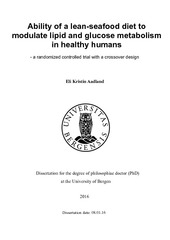| dc.contributor.author | Aadland, Eli Kristin | en_US |
| dc.date.accessioned | 2016-03-18T11:52:28Z | |
| dc.date.available | 2016-03-18T11:52:28Z | |
| dc.date.issued | 2016-01-08 | |
| dc.identifier.isbn | 978-82-308-3414-5 | en_US |
| dc.identifier.uri | https://hdl.handle.net/1956/11705 | |
| dc.description.abstract | Background: A Westernised lifestyle, which involves a high-energy diet and reduced physical activity, is indisputably linked to the pandemics of obesity and type 2 diabetes. Prevention of cardiovascular disease and type 2 diabetes is a public health goal. Intake of fish has been associated with reduced risk of cardiovascular disease, but data from randomized controlled trials have been inconclusive. Lean fish contains relatively low amount of marine omega-3 fatty acids, and data from both animal and human studies indicate a beneficial effects on lipid metabolism, insulin sensitivity and glucose homeostasis. Studies investigating the potential protective effect of lean- seafood in healthy subjects are warranted. Aim: The overall aim of this thesis was to elucidate how lean-seafood can modulate fasting and postprandial metabolism of lipids and glucose in healthy humans. Subjects and Methods: Healthy Caucasian subjects were recruited from the great area of Bergen. The study included two 4-weeks experimental periods separated by a 5-weeks washout period in a crossover design. Prior to each experimental period, the subjects followed a diet in accordance with the Norwegian dietary recommendations for 3 weeks run-in periods. Half of the group (6 men and 8 women) was randomly assigned to begin with a lean-seafood diet and the other group (4 men and 9 women) to a nonseafood diet. The lean-seafood diet consisted of lunch- and dinner meals with cod, pollack, saithe and scallops and the nonseafood diet contained skinless chicken filet, lean beef, turkey, pork, egg, milk and milk products. The protein contribution from the experimental protein sources in both diets corresponded to 60 % of total protein intake, and the remaining dietary proteins came from vegetable and cereal sources. Results: Healthy subjects had after 4 weeks lean-seafood intervention, a highly significant reduction in fasting and postprandial circulating TAG concentrations, relative to the 4 weeks nonseafood intervention. There is evidence that raised circulating TAG levels are associated with increased coronary heart disease risk. The TAG/ HDL-cholesterol ratio was decreased during the lean-seafood intervention and increased during the nonseafood intervention. The intervention did not alter fasting and postprandial serum glucose or insulin concentration. However, lean-seafood intake reduced postprandial C-peptide and lactate concentrations. Lean-seafood intake improved mitochondrial oxidative capacity as indicated by human urinary metabolomics. All results are consistent, indicating an improved preservation of insulin-sensitivity after lean-seafood consumption. Conclusion: Based on our data lean-seafood regulates fasting and postprandial lipids and glucose metabolism differently in healthy subjects after four weeks. Lean- seafood modulate fasting and postprandial lipids, and postprandial glucose metabolism in healthy individuals in a manner that may have an effect on the long- term development of cardiovascular disease, insulin-resistance and type 2 diabetes. An increased intake of lean-seafood should be encouraged as a part of a healthy diet in the prevention of CVD and T2D, and therefore may have a part of combating the development of these health challenges. | en_US |
| dc.language.iso | eng | eng |
| dc.publisher | The University of Bergen | eng |
| dc.relation.haspart | Paper I: Aadland, E. K., Lavigne, C., Graff, I. E., Eng, Ø., Paquette, M., Holthe, A., Mellgren, G., Jacques, H. and Liaset, B. (2015). ”Lean-seafood intake reduces cardiovascular risk factors in healthy subjects: results from a randomized controlled trial with a crossover design”. Am J Clin Nutr. 102(3):582-592. This article is not available in BORA. The published version is available at: <a href="http://dx.doi.org/10.3945/ajcn.115.112086" target="blank">10.3945/ajcn.115.112086</a> | en_US |
| dc.relation.haspart | Paper II: Aadland, E. K., Graff, I. E., Lavigne, C., Eng, Ø., Paquette, M., Holthe, A., Mellgren, G., Madsen, L., Jacques, H. and Liaset, B. (2015). “Lean-seafood intake reduces postprandial C- peptide and lactate concentration in healthy subjects - results from a randomized controlled trial with a crossover design”. (Submitted Sept 2015). Manuscript. The article is not available in BORA. Paper III: Schmedes, M., Aadland, E. K., Sundekilde, U. K., Jacques, H., Lavigne, C., Graff, I. E., Eng, Ø., Holthe, A., Mellgren, G., Young, J. F., Bertram, H. C., Liaset, B. and Clausen, M. R. (2015). “Lean-seafood intake improves mitochondrial oxidative capacity as indicated by human urinary metabolomics”. (Submitted Sept 2015). Manuscript. The article is not available in BORA. | en_US |
| dc.title | Ability of a lean-seafood diet to modulate lipid and glucose metabolism in healthy humans – a randomized controlled trial with a crossover design | en_US |
| dc.type | Doctoral thesis | |
| dc.rights.holder | Copyright the author. All rights reserved. | |
| dc.subject.nsi | VDP::Medisinske Fag: 700 | en_US |
